Early Adversity
Helping children who have experienced early adversity through play
‘To “play it out” is the most natural self-healing method childhood affords’ (Erikson, 1965).
Although it’s not always easy to find the time to play with your children as much as you would like to, you will know quite how central play is for them (and us!). I’ve written before about the importance of play for many reasons including brain development (Why is it important to play with your child – Edx Education), as have thousands of others (as any Google search will tell you!).
We know that play has a multitude of benefits, from connecting with adults, learning to negotiate, exploring ideas, developing creativity and imagination, gaining mastery over fears, reading social cues and recognising and regulating feelings…the list goes on!
What about children who have experienced early trauma?
“Children who have experienced early adversity loose the capacity for play – yet, it is the thing that they most need to move forward”
Little bodies and minds adapt to the environment they are born into. For children who have experienced adverse childhood experiences (ACE) early in life, their bodies have taught them to focus on danger, sometimes from their very first years of life.
To survive, children exposed to early adversity suppress their innate need to connect, be curious and experience joy. Just think about a time you have felt threatened – the last thing you would have want to do is play. Instead, you will have focused on keeping safe and during these moments there is little capacity to explore all the joy the world can offer us.
Not only do children miss out on opportunities to play when they are little and face adverse events, even when they are no longer in a dangerous situation, children still often feel unsafe. It’s not surprising therefore that children with early trauma often struggle to play in the way their peers do. Without having an early safe space to playfully explore the world, children’s play can become delayed, one-sided and repetitive. They can also re-enact disturbing themes in their play.
Children who have been born into danger miss out on so many opportunities to make sense of their childhood adversity experiences and develop their social and emotional regulation skills – such important parts of how we cope with and engage in life.
How can play help children who have experienced early adversity?
“For children who experienced trauma, play constitutes an opportunity to transform their past and to soften the intrusive images and sentiments tied to it” (Chazan and Cohen, 2010)
One of the roles of parents or carers of children who have had such difficult starts to life is to help them feel safe enough to play, encourage them to connect with others and, through this, enable them to gain all those wonderful benefits that play offers.
For children who have had little control over their lives, play can help them feel as though they have some agency. This can provide some hope in what has felt like a hopeless world. It supports them, in a non-threatening way, to work through their feelings, to think about what happened, how it made them feel and how to cope (just as any of us need to help when we have had a tricky experience).
Whilst children may not have the words to work through early trauma and toxic stress, they can start to understand it through play. This is less threatening than trying to talk about things, particularly when feelings related to experiences can be so overwhelming. Unless we provide children with the opportunity to process their experiences, they are likely to remain traumatic and overwhelming for them.
Whatever the type of adversity, play provides children with an opportunity to make sense of their experiences and integrate them into their inner mental worlds, helping them feel that things are more manageable and under their control. Just think about when your child is struggling with something – they often play it out (over and over again) to make sense of it long term.
For example, when a child starts school, they often play teachers. Whilst this can be fun it’s also about making sense of the world, creating a story about who they are and what their experiences mean in a safe way.
What can you do?
It’s always important to think about what children have missed out on due to early childhood trauma and explore how we can provide them with the opportunity to have these experiences. However, children can’t make the most of what we offer them unless they feel safe, so safety always needs to come first. Here are some areas you may want to focus on:
-
Focus on bringing play (and playfulness) into your relationship
“It is through parent-child interaction that children discover that they are inhabited by emotions, thoughts and intentions” (Terradas, Poulin-Latulippe, Paradis & Didier, 2021)
For children who have experienced early adversity, nurturing and interested parent-child interactions that have often been absent or replaced by angry and aggressive interactions. It’s important that we support children to feel safe in their relationship with caregivers to help them learn that connecting with others can be enjoyable.
Attachment-focused play is all about face-to-face interactions which are reciprocal and show the child that they are enjoyable and interesting to be with. I would always think younger – I often play hide-and-seek with the adopted children I work with (even teenagers!), a lovely way to show that separations are OK and that adults come back.
Theraplay is an attachment-focused play therapy which includes activities designed to recreate some of those missed early experiences. You might want to have a look at some of the activities they use (Hand Rub (adoption-focus.org.uk)or see if you can access more formal Theraplay sessions.
-
Don’t forget about the body.
Trauma is held in the body as well as the mind. Children’s nervous systems and stress response systems are affected by early adversity, and they have also missed out on a lot of important sensory experiences. Try to find time for sensory play – include cushions, blankets, materials to make dens, sand, water, bubbles, finger painting. See if you can find things that help stimulate all senses.
-
Help children create a narrative around their experiences.
It’s hard to make sense of scary experiences yet children often naturally play out what has happened to them. Play can help children come to terms with what has happened, re-enact events and play out their inner feelings with a safe adult around.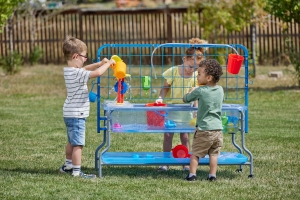
Although you may feel the need to, try not to stop them acting out their deepest fears – they need to learn that feelings are valid and that you can cope with them. If you feel they are becoming overwhelmed or unsafe it’s fine to intervene, whilst making sense of what might have been happening for them. Being able to feel and show anger without getting into trouble must feel so freeing for children who have had to suppress what they are feeling in the past.
Get alongside your child as they play, show them (non-verbally as well as verbally) that it’s OK to express feelings, be curious about what they’re doing and help them find a resolution if they get stuck. Having you alongside them will help them feel less isolated, more understood, and safe enough so they don’t have to withdraw from their internal world.
-
Include emotional language when you play (and at other times!)
If we haven’t been supported to make sense of our feelings or been given the message that they are not important or even dangerous, it’s not surprising that we will find it hard to know what we are feeling and that feelings might feel uncomfortable. So, whenever you can, try to link play to emotional words.
For example, just saying “I wonder what the dinosaur was feeling when her mum went out” could help. And don’t expect children to know…sometimes it’s easier to offer an idea e.g. “she may have felt a bit worried”. If you can, try to link feelings to bodily sensations too.
I hope that some of these ideas resonate with those of you supporting children who have experienced early adversity. However, I’m also aware that it can feel overwhelming trying to support traumatised children. Particularly when they are re-enacting difficult experiences, we can feel worried about saying or doing the wrong thing.
If you are feeling really stuck or worried about your child, I would recommend seeking some professional help. One approach is filial play therapy. This includes care-givers in the sessions and focuses upon supporting children with their attachment relationships as well as expressing their experiences through play.
Thank you to all of those wonderful adoptive parents, foster carers, special guardians and anyone else who are supporting children who have experienced the worst towards recovery.
Author Dr Sarah Mundy
Dr Sarah Mundy is a Consultant Clinical Psychologist (BSc., MSc., PDClin) and author of Parenting Through Stories. She has worked with children and families for 20 years and has specialised in helping parents connect with their children and support them with their emotional wellbeing, particularly those who have been through early adversity.
In addition to continuing to practice as a psychologist, Sarah has written a series of interactive stories (Bartley’s Books) for young children as well as an accompanying Parenting Handbook. Parenting Through Stories aims to help parents find ways to talk to their children about tricky experiences. The handbook provides parents with advice on how to best support their children’s emotional and behavioural development and feel more connected with them (see www.parentingthroughstories.com for more information).
Sarah also writes articles for various publications and has the occasional appearance on BBC television on radio. She lives in beautiful Cornwall with her three children and partner.
Her books are available through Amazon (UK only) or through messaging her directly (hello@parentingthroughstories.com). You can also access free resources and parenting advice through www.parentingthroughstories.com), Instagram (@parenting_through_stories), Facebook (@parentingthroughstories) and Twitter (@bartley_bear).



 edx education
edx education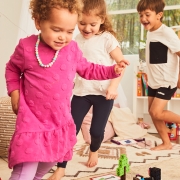 Edx Education
Edx Education Edx Education
Edx Education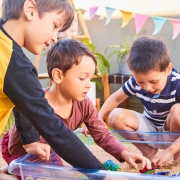
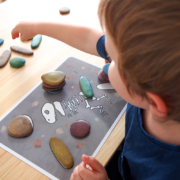 edx education
edx education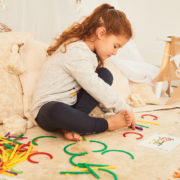 edx education
edx education
